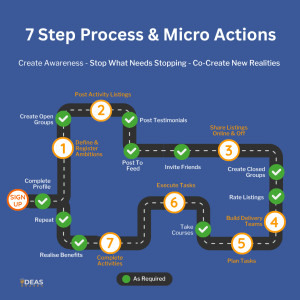Why Collaboration Outperforms Competition: From Self to Society
Section 1 - Header
Section 2 - Top 100 Rating
You must be logged in to rate.
Section 4 - Detailed Info
Introduction
For centuries, human progress has been shaped by two powerful forces: competition and collaboration. Both have their place. Competition can drive innovation, sharpen performance, and push individuals or organisations to achieve more. But unchecked, it often breeds division, inequality, burnout, and inefficiency. Collaboration, on the other hand, taps into our collective intelligence and shared humanity. It is the glue that holds families, communities, businesses, and nations together — and when structured effectively, it consistently outperforms competition in delivering sustainable results.
This article explores why collaboration is not just a “nice-to-have” but an essential driver of personal fulfilment, organisational success, and societal progress. We’ll look at four key focus areas — the Self, People, Organisations, and Society — and examine how competition and collaboration play out in each domain.
1. The Self: Competing With vs. Collaborating With Yourself
Competition at the Individual Level
We are often taught to compete with ourselves: to beat yesterday’s performance, to hustle harder, to measure worth against external benchmarks. While this drive can be motivating, it often comes with a cost: stress, perfectionism, self-criticism, and the inability to rest. The “always competing” mindset can erode mental health and create a cycle of dissatisfaction.
Collaboration at the Individual Level
Collaboration begins within. Instead of seeing life as a constant internal battle, collaboration encourages self-alignment:
>>> Mind and Body working together for health.
>>> Ambition and Rest balancing to sustain progress.
>>> Strengths and Weaknesses complementing rather than fighting each other.
When individuals collaborate with themselves — listening, balancing, and honouring their needs — they become more resilient and effective.
Why Collaboration Wins
>>> Self-compassion breeds growth more reliably than self-criticism.
>>> Long-term habits stick when we collaborate with our biology instead of fighting it.
>>> True creativity comes from flow states, not forced competition.
2. People: Competing Against vs. Collaborating With Others
Competition Between People
From school to the workplace, people are often pitted against each other. Grades, promotions, status, and recognition become scarce resources to fight over. While competition may create short-term winners, it produces long-term losers in trust, relationships, and community. Envy, resentment, and division are natural by-products.
Collaboration Between People
Collaboration harnesses diversity of thought, skills, and experiences. When people support each other, share resources, and celebrate joint wins, they build lasting bonds. The workplace, friendships, and families thrive on collaboration — trust multiplies, ideas flow, and resilience increases.
Examples:
>>> Sports teams that prioritise collaboration consistently outperform those with superstar rivalries.
>>> Families that collaborate across generations create stronger support systems.
>>> Friendships based on collaboration outlast transactional relationships.
Why Collaboration Wins
>>> Emotional connection and trust drive stronger performance.
>>> Shared learning accelerates personal growth.
>>> Collaboration produces abundance where competition produces scarcity.
3. Organisations: Competitive Advantage vs. Collaborative Advantage
Competition in Organisations
Businesses often treat markets as battlegrounds. The language itself is militaristic: “market share,” “attacking competitors,” “winning the customer.” While competition can spark innovation, it frequently leads to:
>>> Short-termism (profit over purpose).
>>> Duplication of effort across industries.
>>> Exploitation of employees and resources.
Competition-driven organisations may succeed temporarily, but often at the cost of sustainability, employee wellbeing, and social trust.
Collaboration in Organisations
Forward-thinking organisations increasingly recognise that the real advantage lies in collaboration:
>>> Internal Collaboration: Breaking down silos between departments to innovate faster.
>>> External Collaboration: Partnering with other organisations — even competitors — to tackle global challenges, from climate change to healthcare.
>>> Collaborating with Customers: Co-creating products and services with end-users to ensure relevance and impact.
Examples:
>>> The open-source software movement shows how collaboration outpaces proprietary competition.
>>> Cross-industry alliances on sustainability demonstrate how shared progress outperforms individual gains.
>>> Companies with collaborative cultures (Google, Patagonia, Unilever) consistently outperform on employee retention, innovation, and brand trust.
Why Collaboration Wins
>>> Collaborative organisations adapt faster to change.
>>> Employees are more engaged and productive in cooperative cultures.
>>> Customers trust brands that build relationships, not empires.
4. Society: Competitive Systems vs. Collaborative Economies
Competition in Society
Entire economies have been built on competition: nations racing for GDP growth, political parties fighting for dominance, individuals scrambling up ladders of wealth and status. While competition can drive progress, it often deepens inequality, divides communities, and locks us into cycles of conflict.
Examples:
>>> Political competition reduces complex societal challenges into binary battles.
>>> Economic competition drives monopolies, debt traps, and environmental destruction.
>>> Social competition (status, fame, influence) fuels anxiety and disconnection.
Collaboration in Society
Collaboration offers an alternative model: the Ambition Economy — where individuals, teams, and organisations pool resources, ideas, and skills to achieve shared goals. Collaborative societies:
>>> Solve problems faster (e.g., international scientific collaboration during COVID-19).
>>> Create resilience against crises.
>>> Build trust and shared identity across cultures.
Examples:
>>>> Nordic nations show how collaborative social contracts produce higher happiness, equality, and innovation.
>>> Global humanitarian networks demonstrate how collaboration saves lives during disasters.
>>> Local community initiatives prove that small-scale collaboration strengthens cohesion.
Why Collaboration Wins
>>> Societies thrive when people feel included, supported, and empowered.
>>> Collaboration reduces inequality and conflict.
>>> The challenges of the 21st century (climate, migration, technology) cannot be solved competitively — they demand cooperation.
A New Paradigm: From Competition to Collaboration
Competition will never disappear completely — nor should it. A healthy dose of competition can push people and organisations to stretch further. But the era of pure competition is ending. The global challenges we face today — environmental, economic, political, and social — are too complex for any individual or organisation to solve alone.
Collaboration outperforms competition because it multiplies capacity, creates trust, and builds systems that last. At every level — self, people, organisations, and society — the evidence is clear: collaboration is the superior path to sustainable success.
Conclusion
Collaboration With Common Sense
When we talk about collaboration outperforming competition, it’s not about enforcing some kind of utopian dream where everyone is treated exactly the same, nations dissolve, and identities disappear. That’s not the real world. Nor is it healthy to pretend competition has no value.
The reality is this: the world is diverse, unequal, and often unfair. Elites remain insulated from the very policies and crises that impact everyday people. In this context, naïve idealism — whether it comes packaged as “woke” agendas or top-down utopian visions — can do more harm than good if it is imposed without regard for context, compatibility, or lived realities.
What we need is common-sense collaboration:
>>> Collaboration that builds on practical shared goals rather than abstract ideals.
>>> Competition that drives improvement without leaving destruction in its wake.
>>> A balance that respects differences but still finds common ground where progress is possible.
Healthy collaboration does not erase identity, sovereignty, or individuality. Instead, it creates the conditions for people, organisations, and societies to work together where it matters — solving problems, seizing opportunities, and building a future that is both ambitious and achievable.
In short, this is not about utopia. It’s about realism. It’s about building structures where competition pushes us forward, but collaboration ensures no one is left behind in the process.
That’s why the Ambition Economy exists. Not to dictate how people should live, but to provide the tools and space for compatible people, teams, and organisations to make things happen — without waiting for permission, and without causing the very destruction they’re trying to prevent.
Because together, with common sense, anything is possible.
Section 5 - Media
Section 6 - Next Steps
Section 7 - Location
Section 8 - Interest Areas
Section 10 - Contact Details
Section 11 - Listing Reviews
Login to Write Your ReviewThere are no reviews yet.



